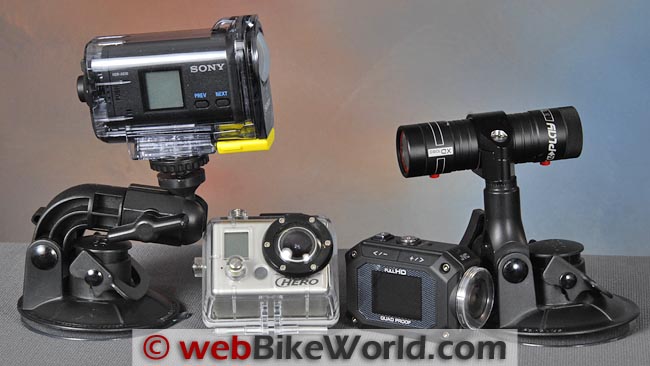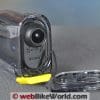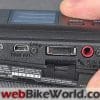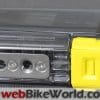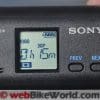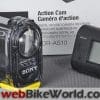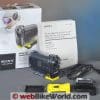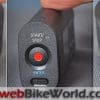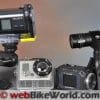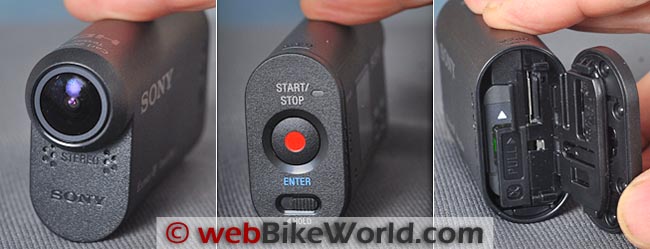The Sony Action Cam is yet another new entry in the burgeoning motorcycle video camera market.
It’s available with or without WiFi and a waterproof housing is supplied with either kit.
The camera can take video at either a 120 or 170 degree lens setting and slow-motion video at 60 and 120 fps is also available.
The menu is easy to understand and use, but there is no live view and the menu system is not accessible when the camera is in the waterproof housing.
The quality of the video is just average compared to other video cameras we have reviewed.
This camera also has a puzzling quirk: video recording starts as soon as the camera is turned on.
High-quality HD “action” video cameras have become smaller and more capable, although in general, their video quality still doesn’t rival most basic digital cameras.
But that hasn’t stopped sales from increasing each year.
The major players have finally taken notice of this trend, with the JVC GC-XA1 (review) recently released and now Sony has entered the ring with the new HDR-AS10 Action Cam.
Sony is a legendary name in video cameras (and other electronics), but in our experience, recent years have seen dramatic decreases in what was once legendary Sony quality.
But the company has received kudos for their Alpha NEX series of digital cameras recently, and we were anticipating equally great results from the Action Cam.
The “action” video camera market has also evolved recently and we have reviewed many new products as they are released. But the “perfect” video camera that is suitable for motorcycle use has yet to arrive.
Let’s take a look at how the new Sony Action Cam compares…
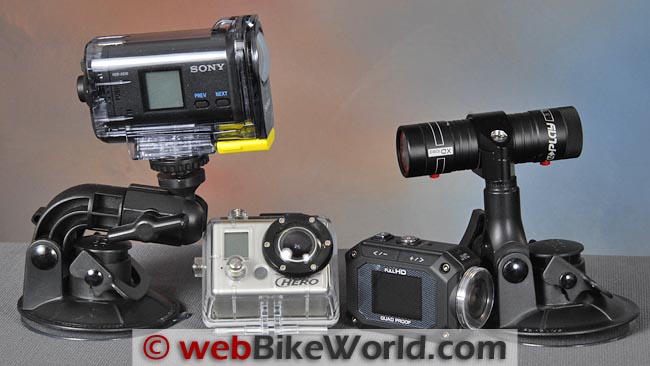
Sony Action Cam Basics
The “action” camera market is roughly split between the types that require a waterproof housing and those that don’t. In the former category are entries including the GoPro Hero HD (review) and the Delkin WingMan (review).
We prefer a motorcycle video camera that does not require a waterproof housing.
Examples include the very nice JVC GC-XA1 (review) we reviewed recently; the Drift HD 170 (review); and our current all-around favorite video camera for motorcycle use, the Replay XD1080 (review).
A waterproof housing usually adds bulk, weight and complexity — three things you do not want in a motorcycle video camera.
It also affects camera operation; typically, the buttons and menu choices are inaccessible once the camera is in its waterproof housing.
The high-quality aircraft aluminum tube shape of the Replay XD1080 is — so far — the best compromise for motorcycle use. Its low-profile shape is small, light and waterproof enough for rugged use.
The buttons are easily accessible and provide haptic feedback, which is helpful when the camera is mounted on a helmet.
And the lens can be easily rotated to orient the lens to account for the unusual angles typically required for mounting a video camera on a helmet or a motorcycle.
Without its waterproof housing, the Sony Action Cam is, like the GoPro HD, comparable to a turtle without its shell — it can be used to take video, but it’s not at all practical.
There is no way you’re going to mount the unprotected camera on a helmet, motorcycle or anywhere else.
The absence of a tripod mount on the camera body ensures that won’t happen and the unprotected, curved convex lens is just waiting to pick up dirt and scratches.
This means that the Sony Action Cam starts out as an 86 gram (3.0 ounce) camera measuring 80 mm long, 22 mm thick and 46 mm tall.
It then becomes a 172 gram (6.125 oz.) camera that measures 100 mm long, 35 mm wide and 70 mm tall once it’s in the waterproof housing.
Since smaller is always better when mounting a video camera on a helmet or bike, that’s not good news.
Sony Action Cam Features
[asa2 tplid=”6″]B01950TF8I[/asa2]The Sony Action Cam is available in either a WiFi version ($269.99 list) or a non-WiFi version ($199.99 list).
We opted for the non-WiFi version after experiencing difficulties getting the JVC GC-XA1, which comes with WiFi (and does not require a waterproof housing) to connect.
Other than the WiFi addition, both cameras are identical.
The waterproof housing comes with both versions of the Sony Action Cam. It protects the camera body and it also has a tripod mount, which is needed to mount the camera on a helmet or motorcycle.
The Sony Action Cam is easy to use.
The monochrome LCD menu screen does not have a live view, but it provides easy navigation through the menu system; menu choices are made with “Prev” and “Next” buttons, along with the large rubberized on/off button in the back.
Anyone with basic camera experience should have no problems quickly getting the Action Cam up and running without having to resort to the included “cheat sheet” or the full owner’s manual.
Both of those are included in the camera’s firmware (which downloads to your computer the first time the camera is connected).
The camera takes a microSD card or Sony Memory Stick Micro (Mark 2) card, Class 4 or higher. A memory card is not included in the kit.
We couldn’t find a specification for the rated capacity of the microSD cards acceptable for use in the Action Cam.
Video is recorded in MPEG4-AVC with H.264 format, while sound is recorded in two channel MPEG-4 AAC-LC format.
Like the JVC GC-XA1, the Action Cam has a built-in image stabilization feature (that can be disabled if desired).
But also like the JVC, this feature isn’t as useful for motorcycle video, where the camera is usually on a mount or firmly attached to the helmet or motorcycle.
The Action Cam takes still shots (interval recording) at 5, 10, 30 or 60 seconds. Video recording formats are 1920 by 1080 (full HD) at 30 frames per second; 1280 by 720 (720p) at 30 frames per second or VGA at 680 by 480 (30 FPS).
Super-Slow Motion
One of the most interesting features of the Sony Action Cam is its ability to record video at 60 FPS or 120 FPS (in 720p only) for slow and super-slow motion.
The slow-motion video is both interesting and fun to watch.
Surprisingly, we found that the 120 FPS video has better quality and is (naturally) smoother than the standard 30 FPS HD format.
No other motorcycle video camera we’re aware of at this point can take 120 FPS video, so if you want slow motion, this is it…although it may be more of a novelty for motorcycle use, but for surfing or skiing, this would be a very nice feature.
Sound recording is in stereo and, like every other motorcycle video camera we’ve reviewed, the sound is terrible once you get over 10 MPH or so.
The camera has a monaural speaker and the “beep” feedback during menu choices is helpful and can even be heard (at idle) through a helmet with the rider wearing ear plugs.
The lens of the Sony Action Cam can be set to record at 120 degrees or 170 degrees wide by choosing the setting in the menu system. There is some barrel distortion at 170 degrees; samples of both are included in the on-road video below.
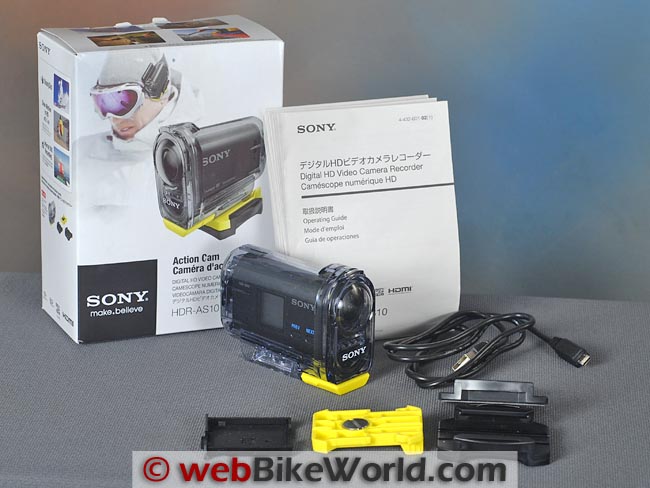
Problems and Issues
Waterproof Housing
The waterproof housing affects the mounting options for the Sony Action Cam.
The camera must be held upright; there is no option to rotate the lens. This is a significant issue for this camera and the GoPro HD, which also requires a waterproof housing and has a flat, rectangular format.
Once the camera is in the waterproof housing, only the single button at the rear can be used to turn the camera on or start recording.
To change anything in the menu system, the camera must be removed from the housing, which can expose it to dust, dirt, water and dirty hands.
Pulling the camera out of the housing is a bit tricky, as the only thing to grab is the lens itself.
Also, we found that the plastic lens built into the housing cover seems to affect the quality of the recording.
And when the camera is set to record at 170 degrees, the edges of the lens can be seen in the video (illustrated in the video below).
Finally, the strap that holds the door of the waterproof housing is flimsy.
The strap broke and the door became separated from the housing after about a dozen openings, which means that the door is loose and can be dropped and/or lost.
Is there anyone who thinks a separate waterproof housing is a good idea for a motorcycle video camera?
Starting and Stopping the Recording
One very strange and disappointing feature is that whenever the camera is turned on, it immediately starts recording.
If you’re not ready to record right away (and you rarely are), you’ll have to stop the recording by pushing the start/stop button again.
This means you’ll end up with many 2-3 second videos of your fingers, wasting battery power and memory card capacity.
Put the camera in the housing, press the button to start it and…the camera starts recording. We suggest that Sony fix this in a firmware update.
Also, the camera can only be turned off by going through several steps in the menu system.
It will turn off after a set amount of time (10 seconds or 60 seconds) if left idle without recording, but this can waste precious battery power.
So once the camera is in its housing, it can’t be turned off unless you remove it from the housing and fiddle with the menu system, or leave the camera without recording for the set amount of time.
It is also possible to disable the “off” interval, but then you have to go through the menu system to power down the camera.
Color Accuracy
Although the overall automatic exposure capability is acceptable and most color accuracy is average, our camera greatly oversaturates blue colors to a point where the sky appears abnormal and cartoonish.
The Action Cam also tends to render shadows with a strong blue color cast.
So overall, our feeling is that the video quality of the Sony Action Cam is not up to the same standards as the JVC GC-XA1, the Replay XD1080 or GoPro HD.
This is surprising for a company like Sony, with many years’ experience in designing and building video cameras.
microSD Card Slot
One more quirk: the microSD card slot on our camera is very fussy. The microSD card can be incorrectly inserted upside-down, which feels correct.
But the camera gives a flashing warning on the menu screen when powered on if the card is inserted incorrectly.
It almost always takes 2-3 tries to get the card seated correctly even when it is inserted properly; it feels like it’s correctly seated but the camera doesn’t accept it and the error message flashes again.
The card slot seems poorly designed and is very fussy about the way the card is inserted for some reason…
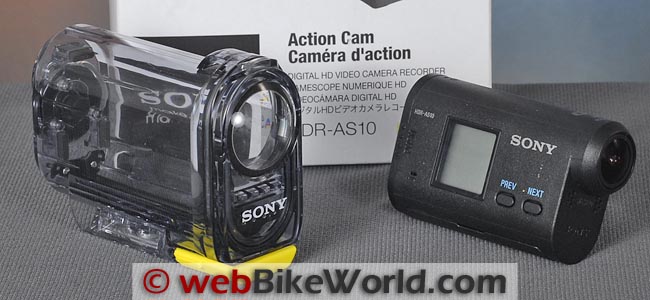
Battery Life
Like the JVC GC-XA1, the Sony Action Cam battery life is poor. We are only able to take about 30 minutes of video before the battery is down to its last bar.
And again just like the JVC, it takes about 4 hours to charge the battery via the USB cable connected to a powered USB port on the computer.
The USB port is on the underside of the camera body, under a flimsy-feeling door.
An HDMI port and external microphone port are also located in this position, but the external mic port is only accessible if the camera is not in the waterproof housing, and it is very difficult to use the camera when it’s not in the housing.
It also seems to take a couple of tries when connecting the USB cable to get the camera to start charging.
The NP-BX1 battery slides into a plastic tray before the assembly is inserted into the camera. An extra tray is provided; extra batteries are optional and at least you can keep a charged spare on hand if needed.
The battery is a lithium-ion type, rated at 1240 mAh at 3.6 Volts. Note that the battery is rated for operation at a temperature range of +32 degrees F to +104 F (0 to +40 C).
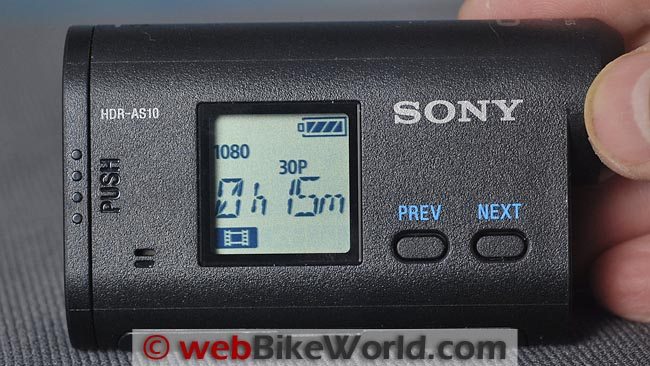
In the Box
The Sony Action Cam kit is minimalistic; it comes with the camera, the waterproof housing, two battery trays, a single goggle mount, a USB cable and the battery.
Optional extra-cost accessories include a head strap, a bicycle handlebar mount and the Delkin “Fat Gecko” suction cup mount (review).
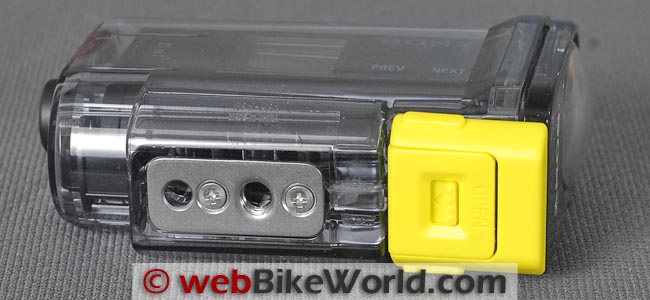
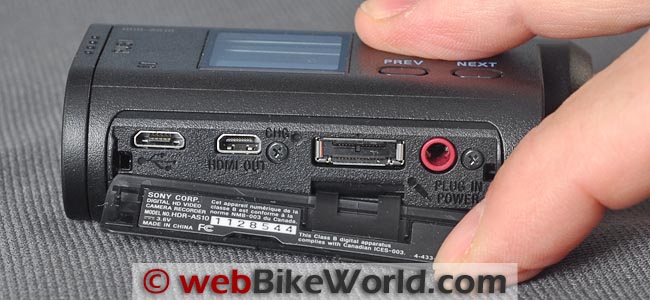
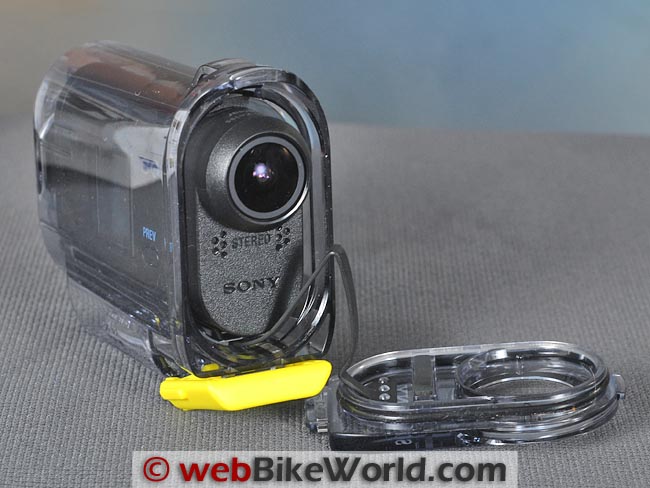
Mounting the Sony Action Cam
Once more, as we have stated many times in our video camera reviews, mounting a motorcycle video camera is always an issue, and smaller is almost always better.
The Sony Action Cam is no different and, in fact, it may be more difficult to mount than some other cameras. (Read our Motorcycle Camera Mounts Reviewed and Part 2: More Motorcycle Video Camera Mounts Reviewed).
Since there is no live view, it takes some trial-and-error to get the Action Cam aligned properly.
Although you may think it may be easier to align a camera with a 170-degree lens, it’s actually more difficult because so much is captured in the frame.
The WiFi version of the Action Cam may be the preferred solution for those with a “smart” phone (and if the WiFi connection can be established).
But for either version of the camera, the user is limited to a vertical position only, with the tripod mount on the bottom of the waterproof housing. With the vertical design of the Action Cam, this means that a helmet mount can be problematic, or clumsy at best.
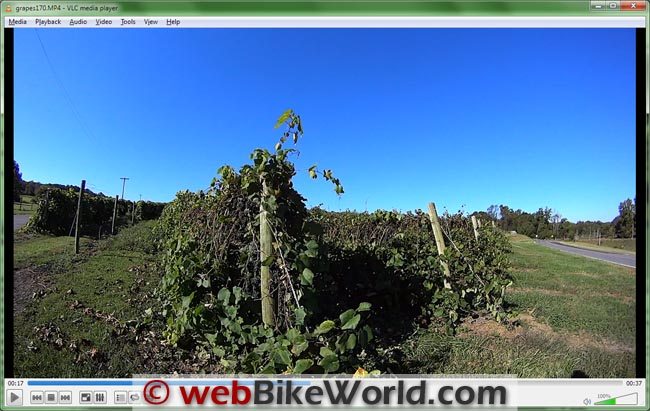
Video Types and Quality
Most of the video we have taken with the Sony Action Cam is full HD at 30 fps. The video quality is acceptable but slightly below the quality of video produced with the JVC GC-XA1 or GoPro HD.
The Sony Action Cam has a few problems with fast exposure transitions and we can see the “step” approach used as the camera’s automatic exposure system adjusts as it goes in and out of the shadows.
This can be seen in the YouTube on-road video, although the YouTube compression algorithm tends to degrade video recorded with rapid movement, such as the type taken on a motorcycle.
The video quality from the Action Cam appears a bit grainy and the edges of the subject have a sort of cheap digital camera/cell phone quality.
In general, the colors are slightly over-saturated, as they are in most of the “action” cameras we’ve reviewed, with the blue colors having a dramatically oversaturated appearance to a point where the sky looks cartoonish.
The slow-motion, 120 fps video taken with the Sony Action Cam actually has a better appearance than the 30 or 60 fps output.
Perhaps the increased frame rates allow the exposure to compensate more smoothly.
The 120 fps video is a very interesting effect, but we’re not sure that this is enough to convince motorcyclists to buy the Action Cam instead of other cameras with better video quality.
As mentioned in previous video camera reviews, the “raw” video out of the camera has a better appearance than the video after it has gone through the YouTube compression algorithms.
However, since many owners will post their video on YouTube or other sites, the comparisons are a good indication of the quality of the final product.
Here is a link to a 10-second clip you can download of a full HD Sony Action Cam on-road video sample, directly out of the camera and processed once in Adobe Premiere Elements 11.0 and saved in .mp4, H.264 format.
This will give you an indication of the actual video and sound quality as recorded, directly out of the camera.
|
webBikeWorld Opinionator: Sony Action Cam
|
|
|---|---|
| Picks… | …and Pans |
|
|
Conclusion
Of all the electronics manufacturers, one would think that Sony would “hit it out of the ballpark” with the Sony Action Cam.
But we’re disappointed that the video quality isn’t better than the competition, and in the end, that’s what it’s all about.
Yes, the camera has some nice features, such as the 120 fps video recording capability.
The video is acceptable, with about a mid-pack rating compared to other video cameras we have reviewed, but we expected more.
And the design of the waterproof housing needs some improvement.
Also, as with other motorcycle video cameras we have reviewed, mounting remains an issue.
The bottom line is that the Replay XD1080 is still our current favorite when it comes to ease of use, mounting and accessibility for motorcycle use.
More webBikeWorld:
▪ Video Action Camera Reviews
▪ Intercom and Radio Reviews
|
wBW Review: Sony Action Cam
|
|
|---|---|
| Manufacturer: Sony Electronics, Inc. | List Price: $269.99 (with WiFi). $199.99 (without WiFi). |
| Colors: Black. | Made In: China |
| Review Date: October 2012 | |
Owner Comments and Feedback
See details on submitting comments.
From “P.S.” (April 2013): “Thanks for a good review. Having owned one of these for a few months, I would like to note that you can turn on the cam without recording.
Just use the buttons on the side not the red one at the back, which is the record button.
I have also used this with the front door of the housing removed, and the cam secured with some rubber bands to prevent it sliding out. This gives better video and audio quality, at the expense of no weather protection.
The WiFi model had no problems syncing to my iPad and iPhone, and offers both Live View for setting up, as well as file transfer of recorded video files.”
Editor’s Reply: Note that we were referring to operating the camera when it is in the waterproof housing. There are no side buttons on the waterproof housing.
From “T.G.” (October 2012): “The biggest pitfall that all these other action cam companies has is that they offer almost no mounting solutions. This is why GoPro is the complete King in the action cam field.
Also JVC and Sony are barely playing catch up. GoPro just announced the Hero3 that records in 4K super high resolution modes. What Sony needs to do is fill a niche… Give me 1080p at 240 frames per second.
A lot of guys are screaming for a high speed action cam, and nobody is delivering one that does 120fps or 240fps at 1080p. They all scale back to SD resolutions for the high speed frame rates.
And as always, thanks for the real reviews on these cameras, many other sites just repeat the company press release.”
From “R.L.” (October 2012): “Thanks for reviewing the Sony Action Cam, much appreciated! As Sony is one of the major CAM-recorder manufacturers, I was expecting a product with little to no issues.
Reading your review and looking at the recordings, I have to conclude it is a major let-down from such a manufacturer. Some issues are so basic, one would expect that a company such as Sony would not have stepped into that hole and fumbled.
This camera is definitely not for me! Yikes!
As for your review of the mounting options for Action Cameras (review), I do not know if you have noticed that RAM Mounts recently released the RAM Mount for GoPro.
With that mount you can mount GoPro’s in the many RAM-mount options, and I have to say, it works quite nice on my bike (RAM-mount on dashboard, oil-reservoir on handlebar and suction-cup).
And finally, I hope you can find the time and resources to do a review of the VIO POV HD camera and the new upcoming GoPro Hero 3.
I own 2x GoPro Hero 2’s, the Contour Plus and the VIO POV HD, and the latter I really look forward to your opinion on it.
Other then that, thank you for your as always more then excellent reviews. Keeps us mortals from buying products that are not up to par.”


